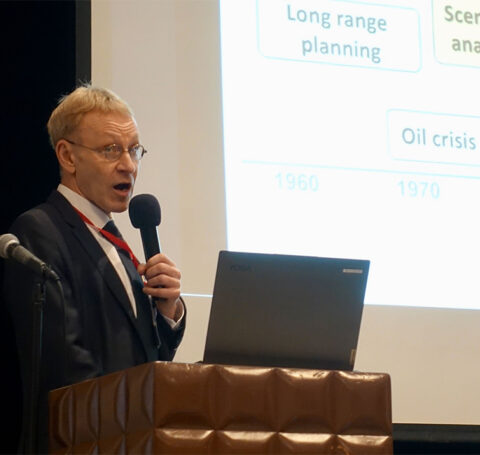Ahti Salo
Title of Presentation: Addressing Strategic Problems under Uncertainty: Advances in Scenario and Decision Analysis
Abstract:
In crises such as the COVID-19 pandemic, policy and decision makers are under extreme pressure as they must assess major uncertainties before committing themselves to decision alternatives which can have far-reaching consequences for health, environment, economy and society. In order to ensure that relevant uncertainties and their impacts in the evaluation of alternatives are systematically assessed, effective methods of scenario and decision analysis are needed.
In this talk, I first summarize personal experiences from the policy initiatives which the Prime Minister’s Office in Finland introduced to strengthen the dialogue between policy makers and researchers.Specifically, the COVID-19 Science Panel had an impactful role in advising the Government during the pandemic while the production of widely disseminated research reviews provided science-based support to a broad range of senior policy makers. The need for collaborative risk management was recognized, reflecting the fact that in many-faceted problems such as the COVID-19 pandemic, there is a need to bring in expertise from a broad range of stakeholders.
Second, I discuss the benefits of using scenario analysis as a tool for exploring the implications of uncertainties for strategic decisions. Even in situations where scenarios are built primarily from qualitative expert judgments, it can be helpful to leverage quantitative techniques to guide the development of scenarios which are both diverse and comprehensive. When dealing with safety-critical systems, there are reasons to deploy theoretically sound probabilistic methods which, unlike qualitative approaches, can be integrated with techniques of statistical analysis and data science.
Third, I present advances in solving multi-stage decision problems which can represented as influence diagrams where interdependencies between decisions, uncertainties and consequences are shown as directed acyclic networks. Conventional approaches to solving influence diagrams (such as using dynamic programming to solve the equivalent decision tree representation) make the ‘no-forgetting’ assumption in that all earlier decisions must be known when making later ones; yet this assumption may not hold in distributed decision problems. Moreover, earlier approaches have limitations in identifying all non dominated solutions and accommodating relevant logical, resource and risk constraints.
Against this backdrop, Decision Programming is a novel framework (Salo et al., 2022) which accommodates such constraints without making the ‘no forgetting’ assumption. Technically, the influence diagram is converted into the equivalent mixed-integer linear programming formulation which can be solved with standard commercial solvers. The Decision Programming framework is very flexible and can be extended to optimize information structures in order to determine (i) what optional information should be acquired to guide decisions and (ii) how this information should be exploited. Several numerical examples are presented to illustrate that the optimization of information structures holds considerable promise, for example, in devising testing and screening strategies in the presence of resource and risk constraints.
Bio
Professor Salo has worked extensively on the development of decision analytic methods and their uses in resource allocation, innovation management, risk management, technology foresight, and efficiency analysis. He has published widely in leading international journals (including Management Science and Operations Research) and received awards for his research from the Decision Analysis Society of the Institute for Operations Research and the Management Sciences (INFORMS). In 2019, he won the MCDM Edgeworth-Pareto Award, the highest distinction of the International Society for Multiple Criteria Decision Making. He serves on the Editorial Boards of several refereed journals.
Professor Salo has directed a broad range of basic and applied research projects funded by leading industrial firms, industrial federations, and funding agencies. He has been visiting professor at the London Business School, Université Paris-Dauphine, and the University of Vienna. He has been the President of the Finnish Operations Research Society (FORS) for two biennial terms. In 2010-11, he was the European and Middle East representative on the International Activities Committee of INFORMS. In 2010-16, he was a jury member of the EDDA Doctoral Dissertation Award of the Association of European Operational Research Societies (EURO) and chaired this jury in 2016.
He served on the Board of the Association of Parliament Members and Researchers (Tutkas) in 1999-2019. In spring 2020, he was a member of the Science Panel, appointed by the Prime Minister's Office for obtaining scientific support for the management of the COVID-19 pandemic. In 2020-2023, he is a member of the Government Foresight Group, appointed by the Prime Minister’s Office of Finland.

